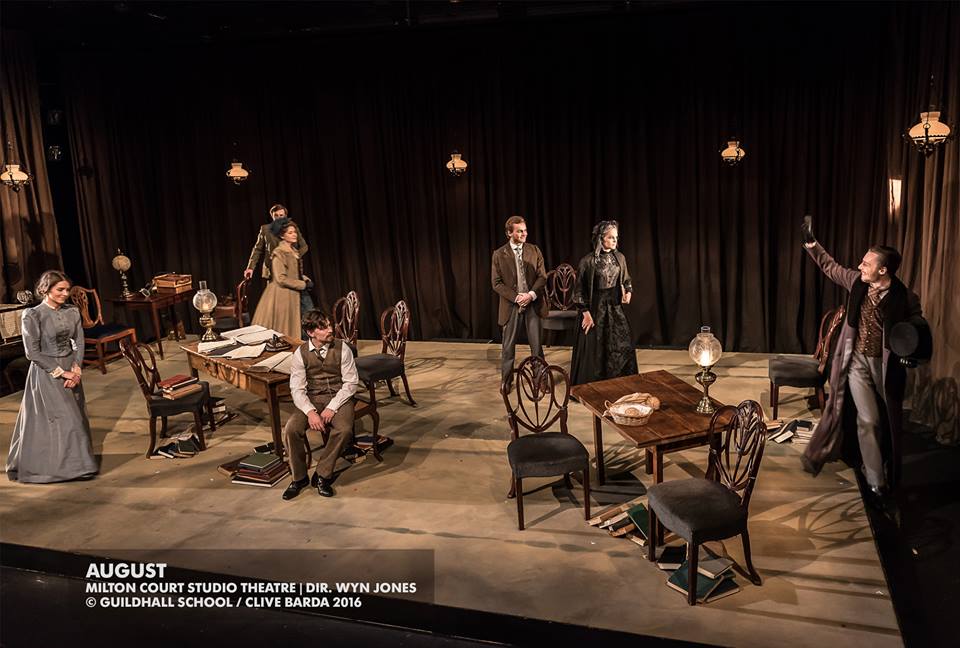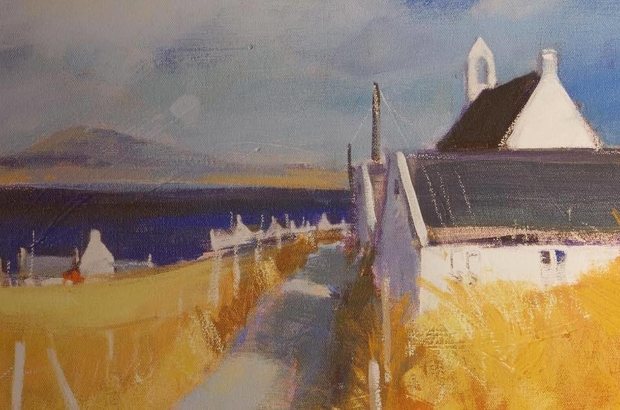BEA BOWLES-BRAY reviews August at the Milton Court Theatre.
The poet Yvan Goll wrote that ‘decline is also a form of voluptuousness’; that there is ‘as much greatness in dying as in procreation’. Saturated with this voluptuous decline is the Guildhall School’s production of Julian Mitchell’s August, an adaptation of Chekhov’s Uncle Vanya. Transposed from rural Russia to the mining valleys of South Wales, director Wyn Jones presents a household on the edge of an abyss. A glamorous London couple arrive at a struggling agricultural estate, throwing the dynamic of the household into disarray and its members into disillusionment with their lot. The sloping concrete slab of stage falling away towards the audience reflects the local doctor’s (Steffan Cennydd) diagnosis of a group enduring the “steady inerrable process of deterioration”. Incorporating speech and song in welsh, itself a ‘dying’ language, this mature production explores individual, societal and environmental senescence with imagination and flair.
Rarely does a piece of theatre sit so comfortably in the new skin of an adaptation as Uncle Vanya does in Mitchell’s August. Chekhov’s discourse on the importance of man’s connection with nature aligns snugly with the deep attachment inhabitants of The Valleys typically feel for their native countryside. Similarly, the playwright’s interest in deterioration underscores the harsh reality of life in a welsh mining community, which is felt more keenly through constant comparison with the London couple. As with the Guildhall’s production of Harold Pinter’s Moutain Language in 2015, the school demonstrates a political awareness in its play selection and a sensitivity which extends through every aspect of a production’s realisation.

The staging of August is at times designed to partially obstruct the audience’s line of sight, giving the impression of witnessing what would normally be hidden behind closed doors. An intruder upon private domestic scenes, the spectator enjoys the full cathartic delight of a Chekhovian dysfunctional family. As the environment onstage becomes increasingly suffocating expect to see squabbles, drunkenness, brawling and gunfire, before returning to your own home with renewed appreciation for your housemates or family. The prevailing mood in August is one of disillusion, however there are startling flashes of melodrama which introduce a fanatical, almost mad aspect to despair. As each character becomes disenchanted with their ideals the only course of action remaining is, as the welsh poet Dylan Thomas wrote, to ‘rage against the dying of the light’.
It is widely known that The Valleys in South Wales struggle with some of the highest rates of unemployment in the UK, rendering poignant the sense in August that characters have “no function”. The only difference between Vanya’s counterpart, Ieuan Davies (Jake Burgum), and the retired and gout-ridden London professor (Luke Thallon) is that unlike Ieuan the professor is able to escape. The englishman’s farewell remark to the welsh contingent of his family to “get down to work and contribute to society” rings dismally of the UK’s insensitive handling of issues faced by rural welsh communities.
Tackling this nuanced play with confidence, the acting in August is consistently strong, with Ruth Ollman and Steffan Cennydd giving standout performances. While Ollman adeptly naturalises the sometimes stiff speech of Chekhov and Mitchell, Cennydd brings an element of Mercutio to his role of the doctor which is wonderful to watch. It is a pleasure to see a canonical play like Uncle Vanya given new life by actors with the talent and respect to do it justice.
‘August’ is showing at the Milton Court Theatre until 15th October. For more information and to book tickets go to http://www.barbican.org.uk/music/event-detail.asp?ID=20044.





